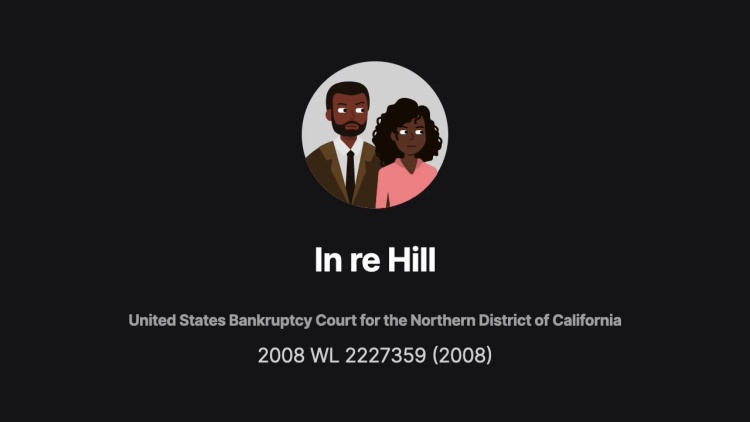In re Hill
United States Bankruptcy Court for the Northern District of California
2008 WL 2227359 (2008)
- Written by Ryan Hill, JD
Facts
The Hills (plaintiffs) bought a home for $220,000. As the home’s value increased, the Hills refinanced the original deed of trust and obtained a junior deed of trust that they refinanced several times. The Hills eventually filed for chapter 7 bankruptcy. National City Bank (the bank) (plaintiff) was the foreclosed-out holder of the junior deed of trust. A year before bankruptcy, the Hills contacted mortgage broker Ellerback to refinance the second deed of trust for a new equity line of credit in the amount of $200,000 with the bank. The Hills’ combined gross annual income was listed as $145,000 on the loan application. Approximately six months later, the Hills increased their line of credit directly with the bank to $250,000. The Hills listed their combined annual income as $190,000 then. The Hills provided a letter attesting to Mrs. Hill’s business and verifying her self-employed income on an accountant’s letterhead, but otherwise the bank required no proof of income. The verification letter was signed actually by someone other than the named accountant. The bank never questioned the increase in claimed income during the six-month period between the two loan applications or verified the claimed income. The Hills’ combined gross annual income never actually exceeded $65,000. The bank sought to except its $250,000 claim from the Hills’ chapter 7 discharge under 11 U.S.C. § 523(a)(2)(B).
Rule of Law
Issue
Holding and Reasoning (Tchaikovsky, J.)
What to do next…
Here's why 907,000 law students have relied on our case briefs:
- Written by law professors and practitioners, not other law students. 47,100 briefs, keyed to 996 casebooks. Top-notch customer support.
- The right amount of information, includes the facts, issues, rule of law, holding and reasoning, and any concurrences and dissents.
- Access in your classes, works on your mobile and tablet. Massive library of related video lessons and high quality multiple-choice questions.
- Easy to use, uniform format for every case brief. Written in plain English, not in legalese. Our briefs summarize and simplify; they don’t just repeat the court’s language.





